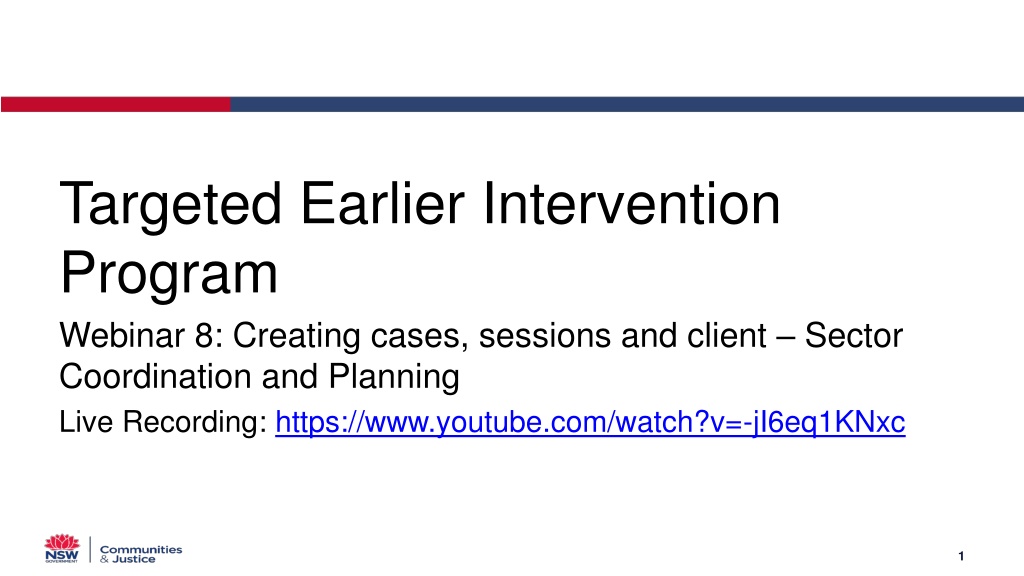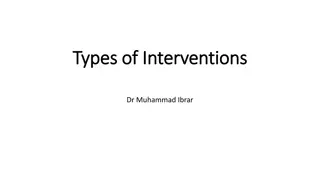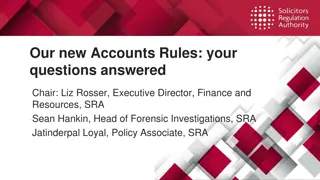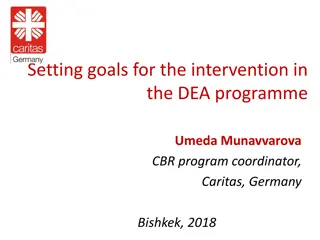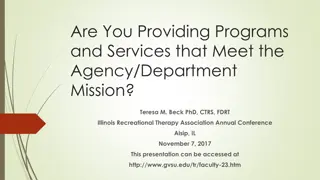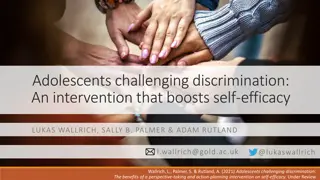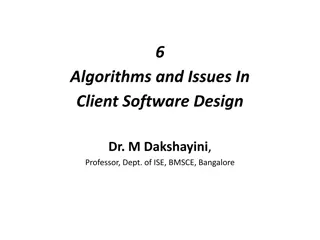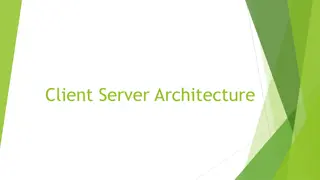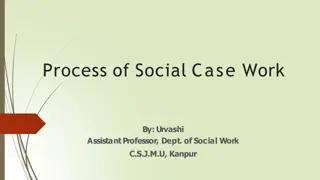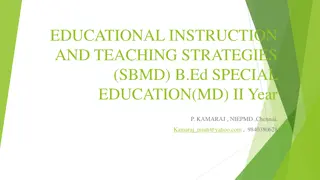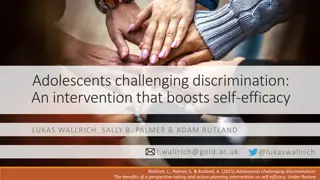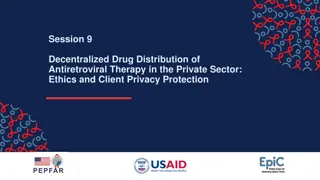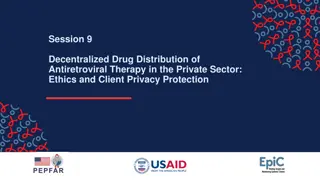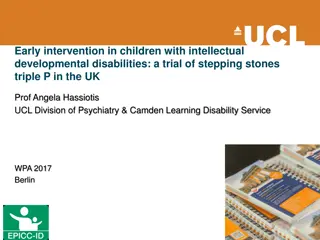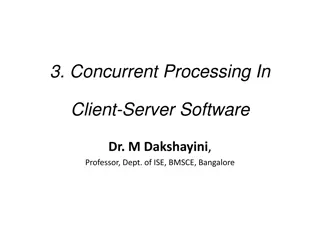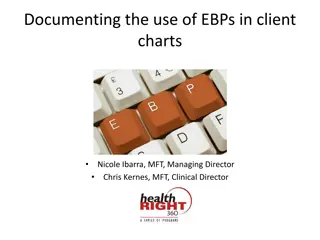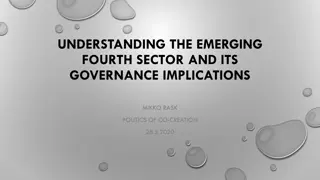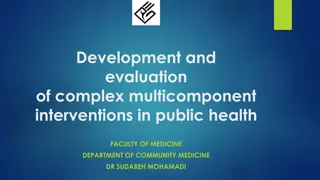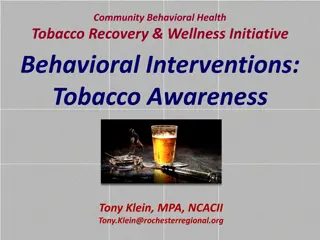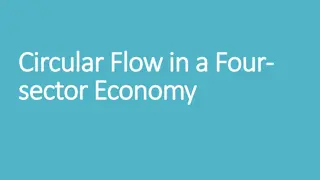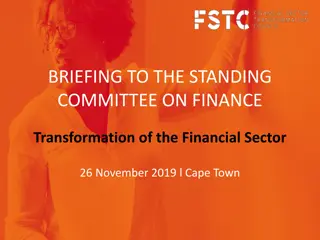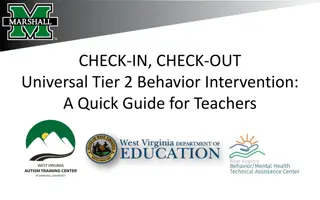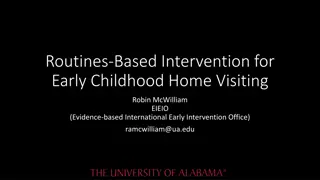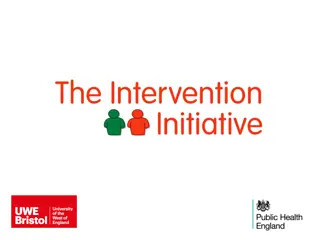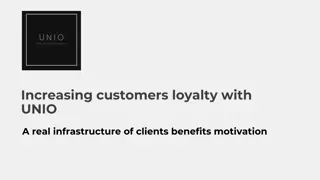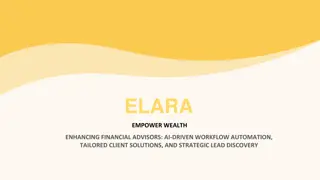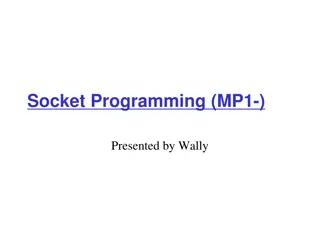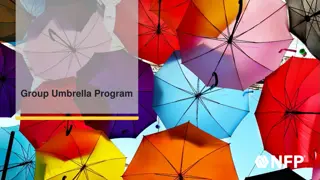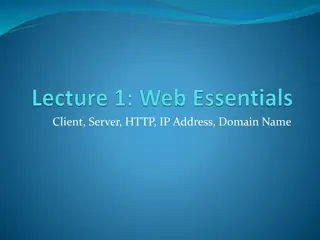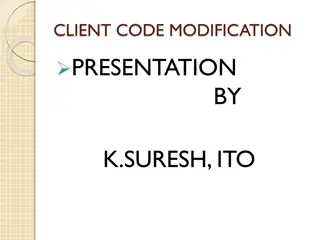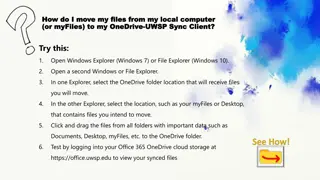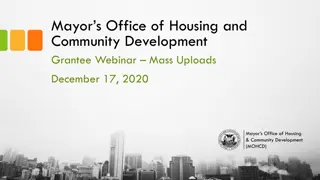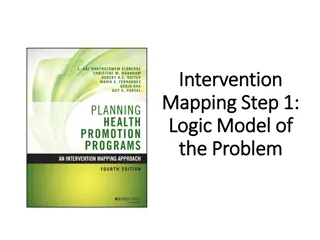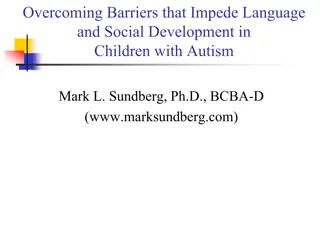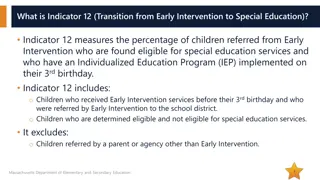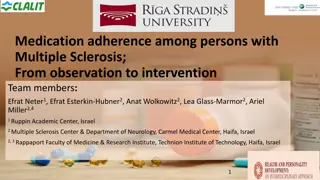Effective Sector Development Strategies for Client Intervention Programs
This webinar series delves into recording sector development activities, understanding the Data Exchange tool, and effectively managing cases, sessions, and clients for targeted intervention programs. Learn how to differentiate between individual clients and unidentified group clients, and optimize reporting practices for better client outcomes. Join us on Wednesday, September 11, 2024, to enhance your coordination and planning skills.
Download Presentation

Please find below an Image/Link to download the presentation.
The content on the website is provided AS IS for your information and personal use only. It may not be sold, licensed, or shared on other websites without obtaining consent from the author. Download presentation by click this link. If you encounter any issues during the download, it is possible that the publisher has removed the file from their server.
E N D
Presentation Transcript
Targeted Earlier Intervention Program Webinar 8: Creating cases, sessions and client Sector Coordination and Planning Live Recording: https://www.youtube.com/watch?v=-jI6eq1KNxc 1
Purpose In this webinar we discuss: Understand how to record sector development activities in DEX Know what the Sector Development Optional Reporting tool is Understand what activities cannot be recorded in DEX Wednesday, September 11, 2024 2
Data Exchange Quick Start Guide Key resource: Quickstart guide to the Data Exchange This document outlines the 11 key steps you need to follow to access and start using the Data Exchange. It includes links to key resources for each step.
Quick start guide: step 8 and 9 Quickstart guide to the Data Exchange Wednesday, September 11, 2024 4
Cases, sessions and clients Outlets Outlet Location of service delivery Cases Individual Clients Case Cases are container s. Cases store information about program activities and outlets. Sessions Session Session Sessions are individual episodes of service. Clients Individual Clients Individual Clients An individual who receives a service as part of a funded activity that is expected to lead to a measureable outcome. Wednesday, September 11, 2024 5
Who is a client? A client is: An individual who receives a service as part of a funded activity that is expected to lead to a measureable outcome. Clients can be individuals or groups. Individual clients Unidentified group clients Individual people who receive a service under the TEI program that is expected to lead to a measureable outcome. A group of people who have received a service under the TEI program. No identifying information is collected from these clients. An individual person who has/will have a client record created in the Data Exchange. Wednesday, September 11, 2024 6
Reporting individual clients vs. unidentified groups Individual clients Unidentified group clients You should try to report individual client data when it is practical and possible. Some examples: o Training sessions Unidentified groups are recorded if it is not practical or possible to collect individual client information. Some examples: o Meetings o Interagencies Individual clients can be attached to both Cases and Sessions Cases record the anticipated number of unidentified clients. Sessions record the actual number of unidentified clients. These fields should NOT be used to bulk report services to individuals or groups. You can report a combination of individual clients and unidentified group clients.
Who are your clients? Clients are the individual staff members who attend a session, meeting or a workshop. They are NOT the organisations you provide support to. This is because its not actually possible to record an organisation in the Data Exchange. If you try to do this, it actually means your entering false data. Which can severely impact our ability to trust the information that s reported to us. Wednesday, September 11, 2024 8
Recording meetings, interagency work etc. Outlet The Hub Clients are the individual staff members who attend a session/meeting etc. Clients are NOT the organisations you provide support to. This is because it is not possible to record an organisation in the Data Exchange. Clients can be individual clients or unidentified clients. Case ID: SWS Interagency meetings Outlet: The Hub Program Activity: Community Connections No. of unidentified clients: 12 You can only record these activities if your service is responsible for organising and running them, (e.g. contributing resources), not just attending them. Session ID: Interagency July 1 Session date: 2/7/19 Service type: Community Sector Planning No. of unidentified clients: 10 Session ID: Interagency July 2 Session date: 17/7/19 Service type: Community Sector Planning No. of unidentified clients: 12 9
Workshops and training Outlet XYZ Office You can only record these activities if your service is responsible for organising and running them, (e.g. contributing resources and staff), not just attending them. Clients are the individual people who attend the sessions Clients can be individual clients, unidentified group, or a combination of both. Case ID: ISS Program Logic Workshops Outlet: XYZ Office Program Activity: Community Connections No. of unidentified clients: 12 Session ID: PL Workshop July 1 Session date: 2/7/19 Service type: Education and Skills Training No. of unidentified clients: 6 Session ID: PL Workshop July 2 Session date: 17/7/19 Service type: Education and Skills Training No. of unidentified clients: 7 Individual clients are attached to the relevant sessions. 10
Ongoing/adhoc support You might provide adhoc support to a number of different organisations throughout the year. This support might be over the phone, in person, or in planned meetings/workshops. You can create a case for the organisation you provide ongoing support to. Create a session each time you provide them with substantial support (e.g. atleast 30mins) Outlet XYZ Office Case ID: B Community Centre Outlet: XYZ Office Program Activity: Community Connections No. of unidentified clients: 8 Case ID: AAA Family Centre Outlet: XYZ Office Program Activity: Community Connections No. of unidentified clients: 15 Session ID: Professional development Session date: 17/7/19 Service type: Community Sector Planning No. of unidentified clients: 12 Session ID: Mentoring session Session date: 2/7/19 Service type: Community Sector Coordination No. of unidentified clients: 1 Session ID: Governance Support Session date: 17/7/19 Service type: Community Sector Coordination No. of unidentified clients: 6 Session ID: Planning session Session date: 2/7/19 Service type: Community Sector Planning No. of unidentified clients: 6
Brokering partnerships You can only record these activities if your service is responsible for organising and running them, (e.g. contributing resources and staff), not just attending them. An organisations works within the local community to build partnerships between relevant stakeholders. They run monthly sessions between the gov. and non-gov. sectors to build better relationships between community organisations, local schools and health services. They also run monthly sessions with local service providers to facilitate better referral pathways for clients. Create a session every time you meet with a group of people. Clients are the individual people who attend the sessions. Clients can be individual clients, unidentified group, or a combination of both. Outlet XYZ Building Case ID: Partnership Coordination 2020 Outlet: XYZ Building Program Activity: Community Connections No. of unidentified clients: 40 Session ID: Referral Pathways 2 Session date: 30/09/20 Service type: Community Sector Planning No. of unidentified clients: 8 Session ID: Gov and NGO partnerships 2 Session date: 31/09/20 Service type: Community Sector Planning No. of unidentified clients: 14 Session ID: Gov and NGO Partnerships 1 Session date: 15/07/20 Service type: Community Sector Planning No. of unidentified clients: 12 Session ID: Referral Pathways 1 Session date: 31/07/20 Service type: Community Sector Planning No. of unidentified clients: 6
Facilitating consultation You can only record these activities if your service is responsible for organising and running them, (e.g. contributing resources and staff), not just attending them. Outlet XYZ Office An organisation facilitated 5 consultation sessions with young people, youth organisations and employers around barriers to youth unemployment. Case ID: Youth Unemployment Consultation Outlet: XYZ Office Program Activity: Community Connections No. of unidentified clients: 12 Create a session every time you meet with a group of people. Clients are the individual people who attend the sessions. Clients can be individual clients, unidentified group, or a combination of both. Session ID: Consultation 1 Session date: 2/7/19 Service type: Community Sector Coordination No. of unidentified clients: 9 Session ID: Consultation 2 Session date: 17/7/19 Service type: Community Sector Coordination No. of unidentified clients: 10 Individual clients are attached to the relevant sessions. 13
Events Outlet The Hub You can only record an event if your organisation is responsible for organising and running the event (e.g. contributing resources, time and staff) It is not expected that service providers collect individual client data from people who attend community events. It may not be practical, possible or appropriate. You can just record the total number of unidentified clients. You can also record a Community SCORE (if possible). Case ID: Naidoc Event Outlet: The Hub Program Activity: Community Connection No. of unidentified clients: 50 Session ID: Naidoc community event August 2019 Session date: 08/07/19 Service type: Community Engagement No. of unidentified clients: 42 14
Recording jointly delivered activities If there is a lead organisation, they can report the total number of clients. Support organisations should report the number of clients they engaged directly. If all organisations contributed equally, all service providers record the activities they conducted. One exception to this rule is for large community events. Split the number of unidentified clients between orgs. Organisations must agree on: the number of unidentified clients SCORE domains and result Outlet The Hub Case ID: Pre-natal drop in centre Outlet: The Hub Program Activity: Community Connections No. of unidentified clients: 10 Session ID: Drop In Day 1 Session date: 2/7/19 Service type: Community Sector Coordination No. of unidentified clients: 10 Session ID: Drop In Day 2 Session date: 17/7/19 Service type: Community Sector Coordination No. of unidentified clients: 12 15
Activities that cant be recorded in DEX Activities you can t record in DEX: Activities that are not funded under the TEI Program Website visits/hits Document downloads Newsletters/Emails Radio show Social media posts (e.g. Facebook, Youtube) Background/behind the scenes work Developing resources, reports, documents, websites/pages etc. See Recording alternate forms of service delivery for more info To record a client (individual and unidentified) in the Data Exchange they must meet this definition: A client is an individual who receives a service as part of a funded activity that is expected to lead to a measureable outcome We know this work is really important. But unfortunately, we can t record it in the Data Exchange. We encourage you to capture this information in the Sector Development Optional Reporting Tool. Wednesday, September 11, 2024 16
Sector development optional reporting tool Optional Reporting Tool - Template Optional Reporting Tool - Appendices Can be used to: supplement the information recorded in DEX. report activities that can t be captured in DEX. Will support SDOs to demonstrate the impact of their work. Wednesday, September 11, 2024 17
Sector development optional reporting tool Advice about how to improve this tool is always welcome. Please email TEI@facs.nsw.gov.au
Resources TEI Resources DSS Resources Taskcards Add a case Add a session Add a client Recording alternate forms of service deliver Learning modules Add a case Add a session Add a client The TEI Data Collection and Reporting Guide How to set up cases, sessions and clients in DEX? What information do I need to record in the Data Exchange? Sector Development Optional Reporting Tool Wednesday, September 11, 2024 19
Where can I go for help? Contact Type of Support DSS Data Exchange Website Training resources for the Data Exchange DSS Helpline: Technical issues with the Data Exchange web platform dssdataexchange.helpdesk@dss.gov.au (NB: not myGovID or RAM) or 1800 020 283 (8.30am 5.30pm Monday to Friday) TEI Website Training resources tailored to the TEI program TEI Inbox: TEI specific questions which are unavailable in existing resources tei@facs.nsw.gov.au myGovID and RAM support line: Support for issues with myGovID and RAM 1300 287 539 myGovID Need help? webpage Support resources for myGovID RAM Help webpage Support resources for RAM Wednesday, September 11, 2024 20
